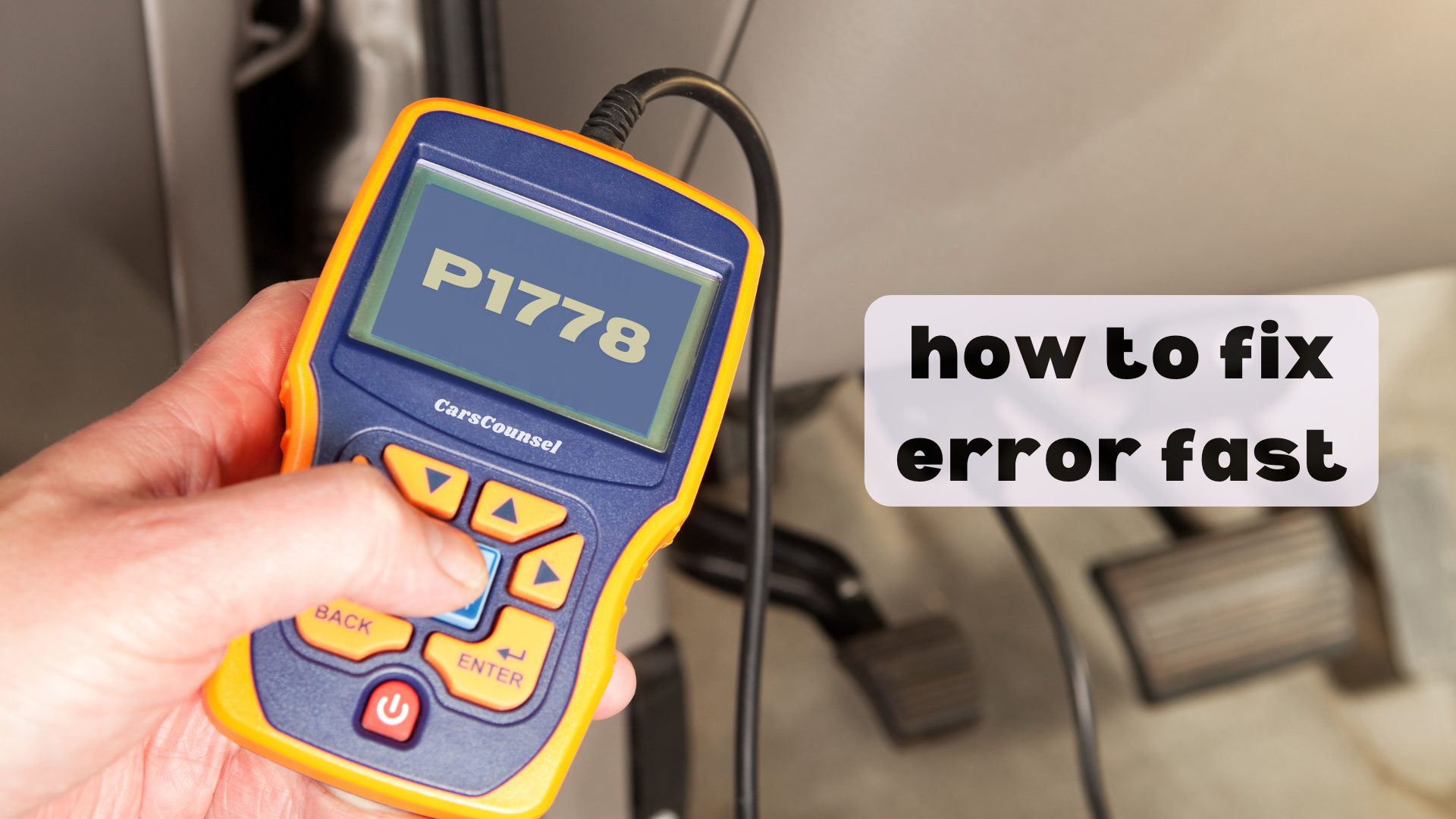Did you know that nearly 30% of cars have transmission problems within their first five years?
If you’ve come across the P1778 code, it means there’s an issue with your CVT step motor, which can cause serious transmission damage if not fixed.
To address this OBD2 Codes error quickly, you’ll need to use an OBD2 scanner to diagnose the problem, check various transmission parts, and make sure the fluid levels are correct.
Want to know the best steps to take and how to avoid future issues? Let’s break down the process to get your car back on the road.

Quick Navigation
Key Takeaways
- Use a code reader to find and understand error codes.
- Check the CVT step motor and replace it if it’s not working properly.
- Look for and fix any damaged or rusty wiring and connectors.
- Make sure the transmission fluid is clean and at the right level.
What Is the P1778 Code?
The P1778 code means there’s a problem with the Continuously Variable Transmission (CVT) step motor, which helps control the gear ratios in your vehicle. This motor is crucial for adjusting the transmission’s gears smoothly and efficiently.
If it fails, your vehicle mightn’t be able to keep the right gear ratios, which can be a big safety risk. Problems with the step motor can mess up pressure adjustments, affecting how stable and controlled your car feels.
It’s important to fix this issue as soon as you can to keep your vehicle safe and reliable. Ignoring the P1778 code could lead to serious transmission damage, expensive repairs, and a bad driving experience.
Impact on Vehicle Performance
Impact on Vehicle Performance
Understanding the P1778 code’s impact on vehicle performance shows how important the CVT step motor is for keeping the right gear ratios and stable driving. If the step motor isn’t working correctly, your car’s transmission can suffer, causing poor acceleration and dangerous driving conditions. This can harm driving safety and might even lead to complete transmission failure.
Here’s a quick look at the impact:
| Issue | Effect on Transmission Efficiency | Driving Safety Concern |
|---|---|---|
| Poor Acceleration | Reduced | Increased risk of accidents |
| Unpredictable Gear Shifts | Decreased | Unstable vehicle behavior |
| Possible Transmission Fail | Severely Reduced | High risk of sudden breakdowns |
| Drop in Fuel Efficiency | Lowered | Higher fuel consumption |
Paying attention to the P1778 code right away is crucial to keep your vehicle running well and safely.
Common Causes of P1778
Several common issues can trigger the P1778 code in your vehicle’s diagnostic system.
The most frequent problem is a failed step motor, which messes up the pressure needed for the speed sensor.
Damaged or corroded wires can also cause trouble by disrupting electrical signals, leading to erratic shifting.
Faulty solenoid valves are another common cause.
Low transmission fluid, whether it’s just low or dirty, can also mess with the hydraulic system.
You might notice your car has poor acceleration and erratic gear shifts if this code appears.
To prevent these problems, regularly check your transmission fluid levels and inspect the wiring for any damage.
Taking care of these issues early can keep your car running smoothly.
Risks of Ignoring the Error
Ignoring the P1778 error code can lead to serious transmission problems, higher repair bills, and even your vehicle breaking down. Neglecting this issue significantly affects both your car’s immediate performance and its long-term durability.
| Problem | Result |
|---|---|
| Transmission Damage | Expensive and major repairs |
| Increasing Costs | Rising expenses over time |
| Vehicle Breakdown | Risk of getting stranded |
| Lower Performance | Poor acceleration and less reliability |
Driving with this error code can cause your transmission to completely fail, leading to steeper costs and more time without your vehicle. Over the long run, your car’s lifespan will be shorter, and its safety could be compromised. Fixing the problem right away helps you avoid these major issues and keeps your car running smoothly.
Steps for Diagnosing P1778
To fix the P1778 error code, start by using an OBD2 scanner to find all the error codes.
Then, check the transmission and related parts for any obvious damage or wear, especially around the step motor.
Make sure the transmission fluid is at the right level and clean, as dirty or low fluid can cause problems.
Take the car for a drive to see how it performs and note any issues.
Finally, test the step motor and solenoid valves to find the exact problem.
A careful diagnosis is key to making sure your car runs smoothly.
Using an OBD2 Scanner
With an OBD2 scanner, you can easily find and read error codes, like the P1778 code, to figure out transmission problems in your car.
Modern OBD2 scanners come with features like real-time data streaming, snapshot data, and thorough scanning methods, ensuring precise diagnostics.
Just plug the scanner into your car’s OBD2 port, usually found under the dashboard, and follow the on-screen instructions to start the scan.
The scanner will use standard methods, like CAN, ISO 9141, or KWP2000, to get the P1778 code.
Once you have the code, you can look into possible causes, such as a broken step motor or wiring problems, helping you plan a specific repair to get your car running smoothly again.
Inspecting Transmission Components
Carefully checking the transmission parts is essential to find issues that might cause the P1778 code. Start by looking closely at the transmission housing, connectors, and wiring. Notice any signs of wear, rust, or damage. Use a multimeter to ensure electrical connections are working properly. Test the step motor and solenoid valves to see if they function correctly. Make sure the transmission fluid is at the right level and in good condition. Write down your findings to help with further diagnostics.
| Component | Inspection Task | Tools Needed |
|---|---|---|
| Transmission Housing | Look for cracks or leaks | Visual Inspection |
| Wiring and Connectors | Check for rust or damage | Multimeter |
| Step Motor & Solenoids | Test if they’re working properly | Diagnostic Tools |
Thoroughly inspecting the transmission and its parts helps you accurately identify any issues.
Repairing Faulty Parts
After finding any problematic parts during the inspection, focus on fixing or replacing them to clear the P1778 code error.
First, if the step motor is broken, replace it. This motor is crucial for adjusting the transmission’s gear ratio.
Next, look at the solenoid valves. If these valves are faulty, they can cause the car to shift gears unpredictably, so you may need to repair or replace them.
Also, check and fix any damaged wiring to ensure proper electrical signals.
These steps are vital for getting your transmission back in working order and avoiding more problems.
Always use good quality parts and follow the manufacturer’s instructions to ensure a successful repair and long-term reliability of your car’s transmission system.
Transmission Fluid Service
Regularly changing your transmission fluid ensures everything works smoothly and can help prevent the P1778 error code.
By sticking to a regular maintenance schedule, you make sure the fluid stays clean and at the right level, which is crucial for the CVT step motor to work properly.
Start by checking the fluid level and quality; it should be clean and at the right level. If it’s dirty or low, it can cause low pressure and poor gear shifting.
Flushing and replacing the transmission fluid as recommended by your car’s manufacturer will keep the system in good shape.
Regular fluid changes not only help prevent the P1778 code but also extend the life of your transmission.
Importance of Timely Repairs
Timely repairs are crucial to stop transmission problems from getting worse and to avoid expensive future fixes. Taking care of the P1778 code right away with regular maintenance ensures your transmission lasts longer and keeps your vehicle running well. Ignoring this issue can lead to serious problems, so act quickly.
- Avoid Unexpected Breakdowns: Fixing issues on time prevents sudden transmission failures.
- Save Money: Addressing problems early is much cheaper than major repairs.
- Improve Safety: A dependable transmission lowers the risk of accidents from sudden issues.
- Enhance Performance: Routine maintenance keeps your vehicle running smoothly.
More OBD-II Codes
Frequently Asked Questions
Can Bad Driving Habits Trigger the P1778 Code?
Yes, your bad driving habits can cause the P1778 code. Things like frequent hard acceleration, sudden braking, and not keeping up with regular transmission maintenance can put a lot of stress on the CVT, which might lead to step motor failures and other transmission problems.
How Often Should Transmission Fluid Be Changed to Avoid P1778?
To keep your transmission in good shape and avoid problems, you should change the transmission fluid every 30,000 to 60,000 miles. Regular fluid changes help prevent buildup and ensure smooth operation, lowering the chances of transmission issues.
Are There Any Preventive Measures to Avoid P1778 Code Recurrence?
To avoid the P1778 code from coming back, it’s important to do regular maintenance on your transmission system. This means frequently checking the step motor, wiring, and fluid levels to make sure everything is working properly.
Can Aftermarket Parts Cause the P1778 Code?
Yes, using aftermarket parts can trigger the P1778 code if they don’t fit properly. Non-OEM components might affect how the transmission works, causing errors. Make sure any aftermarket parts meet the manufacturer’s specifications to avoid problems.
What Are the Symptoms of a Failing Step Motor?
Imagine trying to run a marathon with a sprained ankle. That’s your car with a bad step motor. You might notice the car shifting gears unpredictably, struggling to speed up, or not keeping a steady speed. Make sure to regularly check and maintain the step motor to keep your car running smoothly.
Conclusion
Think of your car like a well-coordinated orchestra. When the P1778 code pops up, it throws everything out of sync and can cause serious damage over time.
To fix it quickly, use an OBD2 scanner to diagnose the issue, check the transmission parts, and service the fluid.
Don’t ignore this warning; act fast to keep your car running smoothly and avoid expensive repairs.

